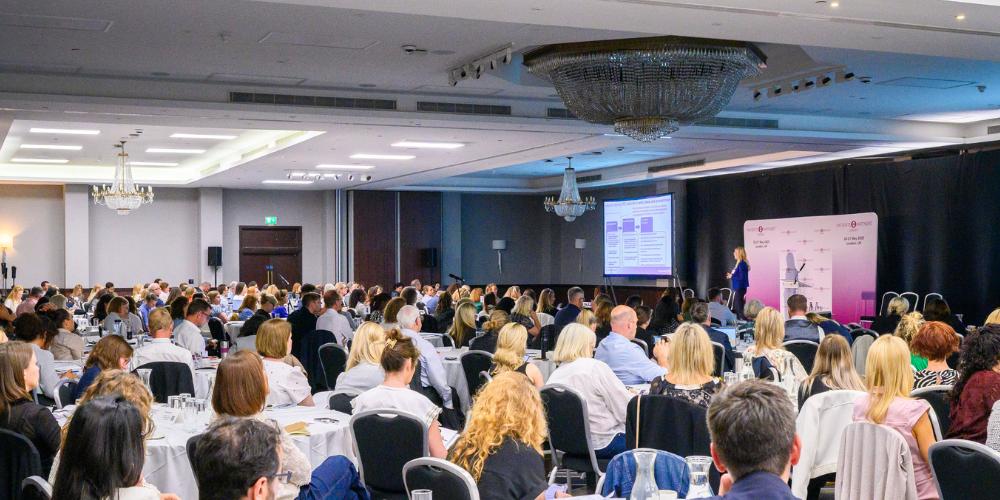Overcoming Reach and Recruitment Challenges to Engage Rare Disease Patients in Clinical Trials
Rare Patient Voice’s Laura Mullen unveils results from a recent patient survey on rare disease patients’ awareness of clinical research, and discusses how researchers can be assisted in connecting with hard-to-reach communities and overcoming the unique difficulties involved in engaging rare disease patients in clinical research.

Clinical research is critical to medical progress, providing the data necessary to develop new treatments, improve outcomes, and offer hope to patients. Nowhere is this hope more urgently needed than in the realm of rare diseases.
Over 7,000 conditions that collectively impact over 300 million people worldwide, not including family caregivers whose lives are also greatly impacted. Despite the significant burden of rare diseases, more than 90% of them lack an FDA-approved treatment and recruiting and retaining patients for rare disease trials is an enduring challenge.
The Complex Landscape of Rare Disease Clinical Trials
The rarity of these conditions means that patient populations are small, geographically dispersed, and often medically underserved. Unlike trials for common conditions, where thousands of patients may be eligible within a single metropolitan area, rare disease trials may struggle to identify even a few dozen qualified participants across an entire country.
These challenges begin at the point of diagnosis. Many rare diseases go undiagnosed or misdiagnosed for years. A patient may consult with multiple specialists before receiving an accurate diagnosis. Without a confirmed diagnosis, patients are typically excluded from clinical trials, meaning potential participants may not even realize they’re eligible or in need of research options.
"The success rate of rare disease clinical research depends on the ability to engage the right patients at the right time, and do so in a way that honors their lived experience."
In addition to diagnostic delays, the symptoms of rare diseases can be severe, debilitating, and progressive. Many patients require significant daily care, which limits their ability to travel, take time off work, or commit to demanding trial schedules. Pediatric rare diseases present an additional layer of complexity, as participation hinges on the availability, willingness, and emotional readiness of family caregivers.
The geographic spread of patients also increases the difficulty of recruitment efforts. A promising trial in New York may be entirely inaccessible to a patient in rural Texas. Sponsors often have limited site locations due to budget or infrastructure constraints, making proximity a key barrier.
Awareness and Accessibility Gaps
Another major hurdle is a lack of awareness, both among patients and healthcare providers. Many general practitioners are unfamiliar with rare disease trials or assume they are irrelevant to their patients. Meanwhile, patients and family caregivers may not know clinical trials even exist for their condition or may struggle to find understandable and trustworthy information.
A Rare Patient Voice (RPV) survey of n=1147 patients and caregivers in the United States found that 57% were only "somewhat aware" of clinical trials. 68% had never participated in a trial primarily because they did not know a trial was available or they did not qualify because their medical history is too complex. 28% said they would like to hear about clinical trial options from their healthcare providers.
Even when patients are aware of clinical trials, navigating trial listings can be daunting. Medical jargon, complex eligibility requirements, and outdated or inaccurate registry information can deter participation. In this context, a trusted intermediary is invaluable, such as someone to help patients navigate the clinical research world and connect them with relevant opportunities.
Building a Bridge Between Rare Disease Patients and Researchers
Rare Patient Voice specializes in connecting patients and family caregivers with all types of research opportunities, including clinical trials, online surveys, interviews, advisory boards, and focus groups. Founded in 2013, the company was built on the principle that the voices of patients are essential to developing better treatments and healthcare options.
The philosophy is that those living with diseases, and their caregiving loved ones, are actually experts on those diseases, through insights resulting from true lived experience.
By cultivating a large, diverse community across over 1,500 diseases and conditions, both rare and nonrare, RPV offers a solution for researchers seeking to engage with disease communities. It maintains a growing database of over 185,000 patients and family caregivers who have opted in to participate in research. These individuals are vetted through internal quality checks and are already motivated to contribute their insights and experiences. For clinical trial sponsors, this eliminates the need to build awareness from scratch and enables rapid, targeted outreach.
Because participants have already expressed interest in engaging with research, they’re more likely to be receptive to clinical trial opportunities when presented with clear, trustworthy information. This engagement level translates into higher recruitment and retention rates.
Through a combination of grassroots partnerships, advocacy collaborations, digital outreach, and in-person patient event presence, Rare Patient Voice connects with patients who might otherwise remain invisible to traditional recruitment channels. These include rural patients, individuals with mobility challenges, and caregivers who are often overlooked in research despite being key participants in care.
"By prioritizing empathy, trust, and empowerment, a more inclusive and effective approach to recruitment is imperative, one that respects the complexity of living with a rare disease while helping to accelerate the discovery of life-changing treatments."
A Human-Centered Future for Rare Disease Trials
The success rate of rare disease clinical research depends on the ability to engage the right patients at the right time, and do so in a way that honors their lived experience. While technology, decentralized trials, and data analytics have an important role to play, human connection remains the foundation.
Bridging that gap is essential to meaningful research towards new treatments and cures for rare diseases. By prioritizing empathy, trust, and empowerment, a more inclusive and effective approach to recruitment is imperative, one that respects the complexity of living with a rare disease while helping to accelerate the discovery of life-changing treatments.
Conclusion
Rare disease patients face a unique and often difficult path when it comes to participating in clinical trials. From diagnostic delays and geographic dispersion to logistical challenges and lack of awareness, the barriers can be cumbersome and significant. Yet, overcoming these obstacles is essential for progress. Fortunately, they are not insurmountable.
Rare Patient Voice engages with patients and family caregivers through a variety of means and provides a critical link between them and the research community, offering a practical, ethical, and patient-centered solution to the recruitment problem.
Thanks to its growing patient and family caregiver network in nine countries, transparent communication, and partnerships with advocacy and support groups, RPV works to ensure that more rare disease patients have the opportunity to participate in research that has the potential to change, and even save, their lives.











